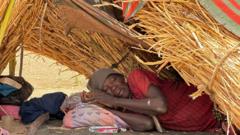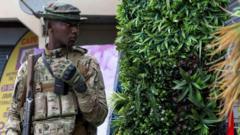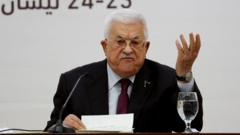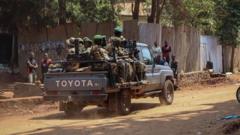As Sudan grapples with the consequences of a brutal two-year conflict, the National Museum stands as a poignant symbol of the cultural devastation inflicted by war. Thousands of invaluable artefacts have been lost or damaged amid the turmoil, prompting fears of a deliberate effort to erase Sudan's rich historical identity.
The Cultural Catastrophe: War's Impact on Sudan's Heritage
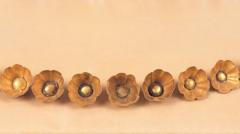
The Cultural Catastrophe: War's Impact on Sudan's Heritage
The ongoing conflict in Sudan has led to extensive looting and destruction of cultural treasures at the National Museum and other sites, severely impacting the nation's heritage.
The Sudan National Museum, once a vibrant center of culture showcasing the legacy of Nubian civilizations, now lays in ruins – a victim of the ongoing war that has ravaged the nation for two years. Impressive statues and ancient artifacts that once drew schoolchildren and tourists alike have been severely impacted as the military seeks to reclaim control over the capital, Khartoum.
As the conflict unfolds, the extent of the cultural destruction becomes increasingly evident. Thousands of artefacts have either been lost to looting or shipped abroad for sale during the chaos initiated by the Rapid Support Forces (RSF). "They destroyed our identity and our history," laments Ikhlas Abdel Latif Ahmed, director at the National Corporation for Antiquities and Museums.
Before the war, the National Museum was undergoing renovations with many valuable items securely boxed. The RSF's incursions made it easier for looters to snatch significant pieces, such as ancient gold items, which are now presumed lost or sold on the black market—potentially to buyers in the UAE, an accusation both parties deny.
Officials and historians warn that this destruction is more than mere chaos—it is a calculated assault on Sudan’s identity, targeting heritage that spans over 7,000 years. According to analysts, the RSF's actions signify an attempt to sever the people from their past, tarnishing centuries of cultural legacy for illicit profit.
The fate of the National Museum reflects a broader narrative of despair, encapsulated by the plight of millions of Sudanese displaced by the conflict. Data indicates nearly 13 million people have been forced from their homes, with casualties numbering over 150,000.
Despite the bleak circumstances, Ahmed and her colleagues remain hopeful for the restoration of their heritage, expressing determination to gather lost collections and rebuild their cultural institutions. "Inshallah [God willing], we will get all our collections back, and we will build it more beautiful than before," she insists. The ongoing conflict may have dealt a grievous blow to Sudan's cultural fabric, but the yearning for restoration continues to burn brightly within the hearts of its people.
As the conflict unfolds, the extent of the cultural destruction becomes increasingly evident. Thousands of artefacts have either been lost to looting or shipped abroad for sale during the chaos initiated by the Rapid Support Forces (RSF). "They destroyed our identity and our history," laments Ikhlas Abdel Latif Ahmed, director at the National Corporation for Antiquities and Museums.
Before the war, the National Museum was undergoing renovations with many valuable items securely boxed. The RSF's incursions made it easier for looters to snatch significant pieces, such as ancient gold items, which are now presumed lost or sold on the black market—potentially to buyers in the UAE, an accusation both parties deny.
Officials and historians warn that this destruction is more than mere chaos—it is a calculated assault on Sudan’s identity, targeting heritage that spans over 7,000 years. According to analysts, the RSF's actions signify an attempt to sever the people from their past, tarnishing centuries of cultural legacy for illicit profit.
The fate of the National Museum reflects a broader narrative of despair, encapsulated by the plight of millions of Sudanese displaced by the conflict. Data indicates nearly 13 million people have been forced from their homes, with casualties numbering over 150,000.
Despite the bleak circumstances, Ahmed and her colleagues remain hopeful for the restoration of their heritage, expressing determination to gather lost collections and rebuild their cultural institutions. "Inshallah [God willing], we will get all our collections back, and we will build it more beautiful than before," she insists. The ongoing conflict may have dealt a grievous blow to Sudan's cultural fabric, but the yearning for restoration continues to burn brightly within the hearts of its people.


